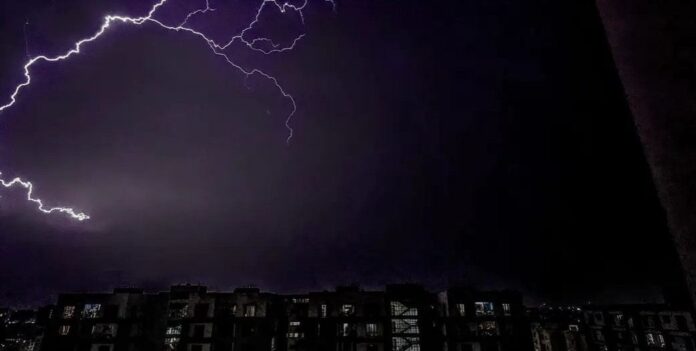Scientists have issued a stark warning about the growing threat of deadly lightning strikes in India, attributed to climate change. The number of lightning-related fatalities in the world’s most populous country has surged, with nearly 1,900 deaths reported annually.
According to a study conducted by researchers from Fakir Mohan University in Odisha, lightning caused 101,309 deaths between 1967 and 2020, with a significant increase noted from 2010 to 2020. The report highlights a troubling trend: “The results indicate a steady increase in lightning activity in India, positioning it as a major killer among climate change-induced natural disasters.”
Also Read: PM Modi and President Putin Discuss Ukraine Visit, Strengthen Strategic Ties
The study, published in the international journal Environment, Development and Sustainability, focused on fatalities rather than the frequency of lightning strikes. It noted that lightning activity in India is becoming increasingly unpredictable.
Data revealed that the average annual number of lightning-related deaths per Indian state rose from 38 between 1967 and 2002 to 61 from 2003 to 2020. This period coincides with India’s population growth to 1.4 billion people.
Lightning strikes are particularly common during the June-September monsoon season, which is vital for replenishing regional water supplies. However, scientists link the rising frequency of lightning to global temperature increases, which heighten atmospheric moisture levels. This additional moisture, when cooled at high altitudes, leads to more intense lightning activity.
The report also points to the high number of fatalities resulting from inadequate early warning systems and a lack of public awareness about lightning safety. Fatalities often occur when people, such as farmers, seek shelter under trees during storms, a practice that increases their risk of being struck.
The study underscores an “alarming development,” with the last two decades showing the highest increase in lightning-related deaths. It warns that worsening climate conditions are likely to exacerbate the situation and calls for urgent policy changes to address and mitigate the impact of this growing threat.
Key Points
- Increase in Fatal Lightning Strikes: Climate change is causing a dramatic rise in deadly lightning strikes in India, with nearly 1,900 deaths reported annually.
- Historical Data: Between 1967 and 2020, lightning caused 101,309 deaths in India, with a sharp increase observed from 2010 to 2020.
- Unpredictable Activity: Lightning activity in India is becoming increasingly unpredictable, according to research from Fakir Mohan University in Odisha.
- Rising Fatalities: The average annual number of lightning-related deaths per state increased from 38 (1967-2002) to 61 (2003-2020), correlating with the country’s population growth to 1.4 billion.
- Impact of Monsoon: Lightning strikes are common during the June-September monsoon season, which is critical for water supplies, but their frequency is rising due to global temperature increases.
- Scientific Explanation: Higher temperatures increase atmospheric moisture, leading to more intense lightning activity.
- Lack of Safety Measures: High fatalities are also attributed to ineffective early warning systems and inadequate public awareness of lightning safety.
- Mass Fatalities: Fatalities often occur when people seek shelter under trees during storms, increasing the risk of being struck.
- Urgent Need for Policy Changes: The report calls for immediate policy changes to address and mitigate the growing impact of lightning strikes in India.



